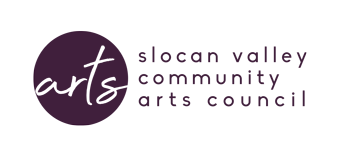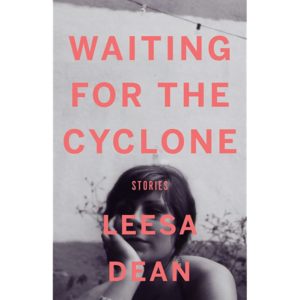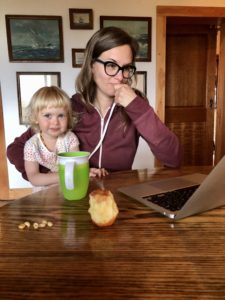Tell us a little about yourself, your work and your art practice.
My name is Leesa Dean and I am a writer living in Krestova with my artist husband, Matty Kakes, and our daughter. My first book, Waiting for the Cyclone, was published in 2016 and my poetry chapbook The Desert of Itabira was published just before the pandemic. The chapbook launch was one of the last events to happen at the Royal before it shut down. That night, between readings by local poets, we distributed pens, paper, and pages from a variety of books and challenged the audience to write found poems. By the end of the night, the entry box was so full it overflowed. I don’t know when that kind of thing will happen again, but I was really moved by the feeling of community and celebration in the room.
At the moment, I am hard at work on my first novel, A Few Red Flags, for which I received a Major Projects grant from the Columbia Basin Trust. The novel takes place here in the Kootenays, mostly in Nelson and the Slocan Valley. In all my writing, I’m interested in the complex ways women show up in the world, especially as mothers. I’m particularly interested in the misfits, the challengers, women who recognize patriarchal structures and work to dismantle them.
What have you been up to these last few months?
Aside from my writing practice, I also teach creative writing at Selkirk College. I just finished teaching an online course with seventeen students, mostly from here in the Kootenays but also from places as far as Vancouver and Edmonton via Amsterdam. Some excellent writing emerged from that experience and as a result, we decided to put together a pandemic-themed issue of the campus literary magazine, the Black Bear Review. You can read the work here: https://blackbearreview.ca/category/creating-in-the-time-of-covid-19/
Other than that, I’ve been writing, mostly at night after my two-year old daughter is asleep. I’ve also been bugging a lot of people to answer random research questions on topics like heli-skiing, beer brewing, messy divorces, yurt life and grizzly-tracking, to name a few.
Another thing happening right now is one of my essays has been included in a new and exciting new anthology called The Changing Face of Canadian Literature: a diverse Canadian anthology. There is a range of work by thirty Canadian authors of different races, cultures, gender identities and abilities. It’s quite humbling and inspiring to have my work included in this book.
Has your practice or work changed at all or been affected, and to what extent, by the pandemic?
Well, not having childcare for several months sure cut into my writing time, but things are starting to level out. In terms of my actual work, the pandemic has thrown a major wrench into plans for my novel. The book takes place over a 16-year period, ending the summer of 2020. I’d already written some parts that took place in 2020 but they no longer make sense. Characters were drinking in bars in May, and recent graduates were preparing to backpack in Thailand. That whole section is so interesting to read now. How quickly things can change, and how fragile notions of freedom really are!
I’m still trying to decide if I shift my novel’s entire timeline by a year so I can keep the sections written in 2020 (complicated), or if I just accept that I have to re-write some of the book (also complicated). I’m starting this think all of this might actually be a good opportunity to engage with what writers do best—capture a particular here and now in a vivid way and record important events as they happen.



